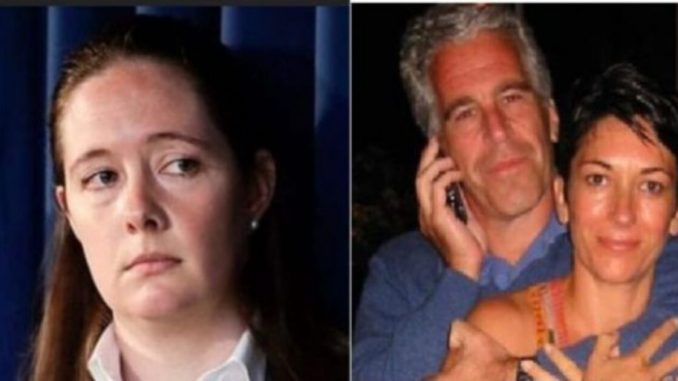
| Published July 8, 2025
Sunday’s announcement of the Epstein files was a shocker. On Sunday, over the weekend a report was released exonerating most all of Jeffrey Epstein’s crimes related to the trafficking of young children for the rich and famous. The initial reaction was that this was not an official DOJ document.
When financier and convicted sex offender Jeffrey Epstein was found dead in his Manhattan jail cell in August 2019, the world erupted with questions—many of which remain unanswered. Was it suicide, as officials claimed, or something more sinister? Fueling the mystery was a startling revelation: the surveillance footage from Epstein’s cell, crucial to confirming how he died, was first reported lost… and then mysteriously found. At the center of this confusing and controversial chain of events stood a familiar name—Maurene Comey, a lead federal prosecutor in the case and daughter of former FBI Director James Comey.
For many observers, the revelation prompted more suspicion than surprise. Why was the daughter of one of America’s most polarizing former law enforcement officials handling one of its most explosive criminal cases? Was her involvement simply professional duty—or another chapter in a broader pattern of politically entangled justice?
As the fog surrounding Epstein’s death refuses to lift, Maurene Comey’s presence in the investigation—and the inexplicable mishandling of key video evidence—raises renewed questions not only about accountability, but about the public’s eroding trust in the institutions meant to deliver it.
🔍 What’s Going On
1. The “Lost and Found” Epstein video claim
-
A recent piece on Joe Hoft’s website highlights that AUSA Maurene Comey—the daughter of ex‑FBI Director James Comey—allegedly reported the surveillance video from Jeffrey Epstein’s cell the night of his death was “lost” but later “found.”
-
This taps into longstanding suspicions around mishandled evidence in Epstein’s death, including missing tapes from his earlier reported suicide attempt.
2. Maurene Comey’s DOJ track record
-
A veteran prosecutor in SDNY’s high-stakes Violent & Organized Crime unit, she played key roles in the prosecutions of Jeffrey Epstein, Ghislaine Maxwell, and most recently Sean “Diddy” Combs.
-
In the Diddy case verdict delivered July 2, she secured convictions on two counts—though not all charges stuck.
🎯 Focus Question: Should it surprise us that Maurene Comey is involved?
Not at all—here’s why:
-
Legal pedigree & experience: She graduated from Harvard Law (2013) and joined SDNY (2015). Since then, she has steadily advanced within a unit that routinely handles sex trafficking and violent crime.
-
Prior Epstein-Maxwell involvement: She was already a lead prosecutor in both cases—so continuing her role in related follow-ups is entirely consistent with her responsibilities.
-
Independently qualified: Maurene’s involvement stems from her own merit and workload—not her surname. SDNY’s attorneys rotate based on expertise, not family ties.
 Implications
Implications
1. Fuel for Conspiracy Theories
The loss of surveillance footage from Epstein’s cell—especially under the supervision of a high-profile prosecutor with a politically connected father—immediately intensified public suspicion:
-
“How convenient,” many skeptics said, pointing out how the only key evidence for Epstein’s prior suicide attempt just vanished.
-
It reinforced widespread beliefs that Epstein didn’t die by suicide, but was silenced to protect powerful figures connected to him.
2. Credibility Blow to the DOJ and Bureau of Prisons
-
The excuse given—that the jail preserved the wrong part of the unit and that the footage was overwritten due to a “technical error”—was seen by many as incompetence at best or cover-up at worst.
-
Coming from the Southern District of New York, known for handling elite cases, this mishap undermined public confidence in federal law enforcement.
3. Optics of Political Conflict of Interest
-
Maurene Comey’s role, while professional and by-the-book, took on symbolic weight because of her father, James Comey, former FBI director accused by both political sides of bias at different times.
-
Her presence in a case involving elite sex trafficking, missing evidence, and suspicious death fed into online narratives that a “deep state” or politically protected elite were managing the fallout.
4. Legal Ramifications for Other Cases
-
The video loss occurred during a proceeding involving Epstein’s former cellmate, Nicholas Tartaglione, who requested the footage to clear himself of wrongdoing.
-
The failure to produce the evidence could have impacted Tartaglione’s defense and raised questions of due process or prosecutorial integrity.
5. Institutional Embarrassment
-
The Federal Bureau of Prisons and U.S. Attorney’s Office were already under fire after Epstein’s actual death—guards asleep, cellmate removed, cameras malfunctioning.
-
Losing footage from two separate key incidents (the attempt and the actual death) was a damning pattern of mismanagement or worse.
 Overall Takeaway:
Overall Takeaway:
The Epstein saga is filled with loose ends, vanishing evidence, and unanswered questions—but perhaps none more glaring than the fact that critical surveillance footage surrounding not just one, but both key incidents in Epstein’s custody went missing. And right at the center of it all is Maurene Comey, daughter of one of the most politically polarizing FBI directors in modern history.
While the mainstream media downplays her role, the optics are hard to ignore. From her father’s controversial handling of high-stakes investigations to her involvement in one of the most explosive scandals of our time, the Comey name keeps surfacing where the truth seems hardest to find. And now, we’re told that one of the few pieces of hard evidence that could clarify what really happened inside Epstein’s cell was simply “captured in the wrong part of the jail” and “no longer exists.”
This isn’t justice—it’s damage control. And for millions of Americans who have watched powerful elites skate free for decades, the message is loud and clear: if you’re well-connected enough, accountability remains optional.
In the end, Maurene Comey’s involvement might be technically appropriate, but it’s not comforting—and it’s certainly not reassuring. When government institutions ask the public to “trust the process” while misplacing key evidence in cases involving global sex trafficking networks, that trust isn’t just shaken—it’s shattered.





Be the first to comment